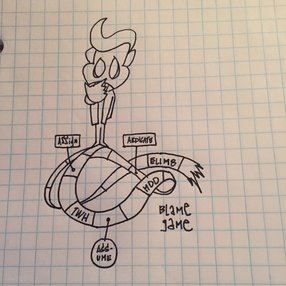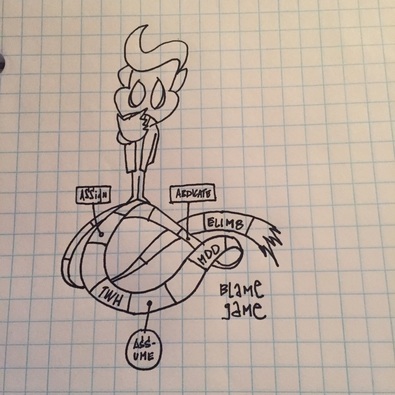 Pizza battle, pizza libre Pizza battle, pizza libre Would you like a slice of controversy pie? A lesson in how leaders call out leaders. According to ESPN, the official pizza sponsor of the National Football League (NFL) is upset that the organization has yet to get their employees under control. "The NFL has hurt us," company founder and CEO John Schnatter said. "We are disappointed the NFL and its leadership did not resolve this (Rovell, 2017).” The pizza company has been hurt and the culprit is a lack of leadership. So, like a true leader the pizza chain mogul pulls out the strong arm of blame. As izvents readers (by the tens) will recall, we recognize blame (more) as a sign of true and enduring leadership. Blame is always a recipe for success and often an indication of a parties investment in finding a solution. Tell us John, how do leaders respond to a lack of leadership? Oh, the answer is sternly worded statements. "Leadership starts at the top, and this is an example of poor leadership," Schnatter said. Papa John’s has been the esteemed official sponsor of the NFL for the last two years, a position they earned by beating out the steep competition through valor, ethical behavior and a commitment to core values shared between the like hearted organizations. (Newsflash noises) This just in, our previous statement was in error, after much research we lament to inform our readers that the origins of their status as official pizza of the NFL was due to their financial investment in the organization and that alone. Papa’s has an official relationship to the NFL and they have benefited for years from that connection, so much so that they are fearful that their recent profit declines will be ongoing if their partner doesn’t get it together and “nip things in the bud”. That sounds like teamwork, the definition of which is always having someone else to blame. Like the saying goes, when the pizza profits hit the fan, blame the NFL. You’re not supposed to quote yourself, but it seems appropriate to dust off an old saying – for as smart as you are, you sure are stupid (more). Not the least of which to mention how socially tone deaf these statements come across. Rather than assist their partner in finding solution, Papa John’s takes a view above the fray and casts their stones into the mix. "We are disappointed the NFL did not resolve this." Yeah NFL, how come you haven't solved racial disparities in America? Oh wait...by "resolve this" we mean declining profits, not that we want America to fulfill "liberty & justice for all. What is humorous is that in the battle of Papa John’s versus the National Football League, the person in a position of leadership for Papa’s notes a lack of leadership as the core of the issue. In doing so, like so many of us learning to live out leadership on the daily, John fails to recognize the void in his own leadership. In moments like these we need the words of the sage of inspirational leadership Michael Jackson, “I’m starting with the man in the mirror. I’m asking him to change his ways.” When faced with an issue, blame isolates us from those whom we could collaborate with to find a solution and conquer the situation. We could use less statements and more action. If a statement is warranted, it’s advisable to take a deep breath and a step back before going public as there are layers to everything. Observations, 3 in jest and 3 that are rather practical:
Reference: Rovell, D. (Nov 1, 2017) Papa John’s says anthem protests are hurting deal with NFL. ESPN Retrieved from - http://www.espn.com/nfl/story/_/id/21250448/nfl-sponsor-papa-john-not-happy-anthem-protests
0 Comments
 Whenever there is an issue such as consistently high turnover, strong leaders understand that the key to success is always having someone to blame. Have you been placed in a leadership position? Are you often frustrated by the inefficiency of having several employees standing around the company water cooler talking shop? There they are again, drinking the water we provide, standing there talking about who-knows-what. What are they talking about, it’s probably negative, right? What does a strong leader* do, they make hard decisions and in a scenario like the one described above – they make the tough administrative order to rid the office of the true culprit of interpersonal discontinuity, that god-forsaken water cooler. That’s how accountability works, remove the source of the problem (More on Eliminating Blame). [Before we proceed, for the sake of clarity (as sarcasm is missed by many), the above reference to the strong leader* is loosely referring to an individual that is much the opposite] Now that the water cooler is gone, it’s time to tackle even more complex issues. In the water-distribution-unit-less organization there still exists an issue with costly employee turnover. An organization that is a revolving door of employees leaving the company via an ever widening door on stage left, has to invest in attracting, hiring and training new hires. The same individuals who have been placed in a position of leadership and who rid their subject organizations of hostile water coolers are the same who frequent their own watering holes to lament about the good old days when employees were loyal. Even though people of our caliber would never be invited to sit in on such a meeting of the minds, if we could be a fly on the wall listening to the discourse regarding why such leaders believe employees leave their fine organizations we would likely hear the following:
Consistently high turnover may be one of the deepest drains on organizational growth as it perpetuates a stasis in the development of employees, inhibits engagement and results in an inconsistent offering to clients. New employees can bring a fresh perspective to a company but without a clear and consistent process an organization will struggle with a clear identity that will assist to attract and keep quality employees. Consistently high turnover sends an alarm to prospective hires and clients, warning them to proceed with caution when engaging with your company. Yet, for the strong leaders that we have been referencing that same alarm is either ignored or is amplified in a pitch that they cannot recognize. Author Travis Bradberry who co-wrote Emotional Intelligence 2.0 and frequently contributes to revered publications such as Forbes, notes that, “Managers tend to blame their turnover problems on everything under the sun, while ignoring the crux of the matter: people don't leave jobs; they leave managers.” If you are an individual in a position of leadership who has consistently high turnover and you blame your employees, don’t ask painful questions and do little to change the trend – than you are reaping the situation that you deserve. Change on the other hand requires listening taking a painful internal inventory and asking earnest questions as to reasons why the organization is unable to attract, motivate and keep high quality employees. Dear leader - bring the water cooler back and the next time there is a gathering of employees don’t wait until you are at your exclusive leadership watering hole to discuss your frustrations but engage your actual team, you may find the answers are closer than you thought (More on Conflict).  How leaders respond to conflicts can either reinforce cultural values that strengthen the team or they can respond in ways that destroy morale. In organizational cultures everyone loves playing The Blame Game and bosses are particularly fond of the follow up game, Crap Rolls Downhill. Both are games are trademarked but neither has any clearly defined rules or pre-determined outcomes. The game is often initiated by conflict and the fantastical response of leadership to avoid responsibility for resolution. Play number one is to assign. This phase of the game is also so joyously referred to as The Witch Hunt. The dice are shaken, rolled and a conflict of sorts ensues as the numbers clamber upon the playing surface. Whether the inquisition is over employee issues, customer service, payments, product failures or the like, bosses will rally the wagons, feigning a quick and concerned response. As the dust settles on the parade of indignation the supervisory fingers are drawn from their holsters with an insatiable thirst for flesh. Assignment of blame is seen by many as a gold star in the managerial belt. If someone can be blamed then we can all conclude that The Witch Hunt was successful. All that a conflict needs in order to be resolved is for some party to be assigned the blame. Shake the dust from our hands and the sweat from our brows, our job is d-o-n-e. Play number two is to assume. When blame cannot be immediately assumed and The Witch Hunt cannot be satisfied, the participants of the game have to make a choice whether they will draw upon the Actually-Investigate-An-Issue card or select from the much thicker Deck of Assumptions. The scientific process is only for nerds, right? Why would any self-respecting manager, who’s time is worth more than pure San Francisco gold, dip their manicured fingers into the Mire of Dispute Discernment? Most management practitioners believe they have achieved their success by trusting their trustworthy gut, so why would conflict resolution be any different? The savvy boss already knows who is guilty, they don’t need crime scene analysis, jury review or the Supreme Court to tell them what they already assume is correct. Play number three is to abdicate. If the dice aren’t rolling correctly and assigning blame nor assumptions are advancing the player through business Candyland, the next option is to pull the wild card that enables a manager to abdicate responsibility. In these scenarios of unresolved conflicts a boss must draw upon prior experience to climb a ladder to boost themselves above the strife or quickly chute down and away from the controversy. If there is a report that says issues will resolve themselves then it must be right and it should be believed. The final alternative play that no one wants to talk about, like it’s some sort of cheat code that no one understands is to eliminate. Elimination of the conflict requires identification of the cause. Why are we in the negative situation that we find ourselves confronted with? What root sources do we need to address in order to ensure that we do not replicate the negative effects? Conflicts are continuous, they can happen at any moment for various reasons and they create an opportunity for growth within the organization. Unfortunately conflicts require leaders to get their hands dirty fixing people issues and process malfunctions but they also remind leaders to be hands on with people and processes. Elimination (Secret Code) Instructions: Crap hits the fan. Find the crap. Get the crap out of the system. Get the crap into a toilet. Flush the crap as soon as possible. Don’t pretend the crap doesn’t exist. Don’t smear the crap all around the office. Don’t kid yourself that the crap will take care of itself. |
AuthorThoughts on personal and professional development. Jon Isaacson, The Intentional Restorer, is a contractor, author, and host of The DYOJO Podcast. The goal of The DYOJO is to help growth-minded restoration professionals shorten their DANG learning curve for personal and professional development. You can watch The DYOJO Podcast on YouTube on Thursdays or listen on your favorite podcast platform.
Archives
March 2023
Categories
All
<script type="text/javascript" src="//downloads.mailchimp.com/js/signup-forms/popup/unique-methods/embed.js" data-dojo-config="usePlainJson: true, isDebug: false"></script><script type="text/javascript">window.dojoRequire(["mojo/signup-forms/Loader"], function(L) { L.start({"baseUrl":"mc.us5.list-manage.com","uuid":"b9016446bd3c6a9f0bd835d4e","lid":"83282ffb9e","uniqueMethods":true}) })</script>
|
Jon Isaacson |
Connect. Collaborate. Conquer.
© COPYRIGHT 2015. ALL RIGHTS RESERVED.
|



 RSS Feed
RSS Feed